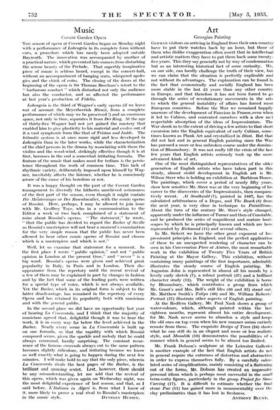Music
Covent Garden Opera THE season of opera at Covent Garden began on Monday night with a performance of Lohengrin in its complete form without cuts, a procedure which has rarely been adopted outside Bayreuth. The innovation was accompanied by another of a practical nature, which prevented late-comers from disturbing the serene beauty of the Prelude. That superbly imaginatiVe piece of music is seldom heard, except in the concert-hall, without an accompaniment of banging seats, whispered apolo- gies and the chink of coins. The cloSing of the doors at the beginning of the opera is Sir Thomas Beecham's retort to the "barbarous conduct " which disturbed not only the audience but also the conductor, and so affected the performance at last year's production of Fidelio.
Lohengrin is the third of Wagner's early operas (if we leave nut of account the Meyerbeerish Rienzi, from a complete performance of which may we be preserved !) and an enormous space, not only in time, separates it from Der Ring. At the age of thirty-five Wagner had not yet gained the mastery that enabled him to give plasticity to his material and evolve out of it a vast symphonic form like that of Tristan and Isolde. The leitmotiv system is at once more rigid and less developed in LOhengiin than in the later works, while the characterization of the chief persons in the drama by associating with them the violins and the wood4ind, strikingly effective though it is at first, becomes in the end a somewhat irritating formula. The feature of the music that makes most for tedium is the persis- tence throughout the work of common time. This lack of rhythmic variety, deliberately imposed upon himself by Wag- ner, inevitably affects the listener, whether he is consciously aware of the cause of his boredom or not.
It was a happy thought on the part of the Covent Garden management to diversify the hitherto unrelieved seriousness of the first part of the season, even though it might contain Die Merstersinger or Der Rosenkavalier, with the comic operas of Rossini. Here, perhaps, I may be allowed to join issue with Mr. Geoffrey Toye, who in a communication to the Editor a week or two back complained of a statement of mine about Rossini's operas. " The statement," he wrote, " that the public has decided to regard the Barber of Seville as Rossini's masterpiece will not bear a moment's examination for the very simple reason that the public has 'never been allowed to hear other comic operas of RoSsini and choose which is a masterpiece and which is not."
Well, let us examine that statement for a moment. In the first place I wrote " public opinion," and not " public opinion in London at the present time," and " never " is a big word. Rossini's operas were given and achieved great popularity in Italy, in Paris and in London. Their dis- appearance from the repertory until the recent revival of a few of them may be explained in part by changes in fashion and by the fact that sonic of the leading parts were written for a special type of voice, which is not always available. Yet the Barber, which in its original form is subject to the latter disadvantage, has remained in the repertory of every Opera and has retained its popularity both with musicians and with the general public.
In the second place we did have an opportunity last year of hearing La Cenerentola, and I think that the majority of musicians agreed that, delightful though it was to hear the work, it is in every way far below the level achieved in the Barber. Nearly every scene in La Cenerentola is built up on one formula, so that the rapidity with which Rossini composed seems, given the sparkle and melody that he could always command, hardly surprising. The constant recur- rence of the famous crescendo always cut to the same pattern becomes slightly ridiculous, and irritating because we know so well exactly what is going to happen during the next few minutes. I will make bold to say that the only piece, wherein La Cenerentola rivals the best pages of the Barber, is the brilliant and amusing sextet. Lest, however, there should be any misunderstanding, let me add that the revival of this opera, which was given again on Wednesday night, was the most delightful experience of last season, and that, as I said before, - L'Italiana in Algeri is, from what I know of it, more likely to prove a real rival to Ros.sini's masterpiece














































 Previous page
Previous page